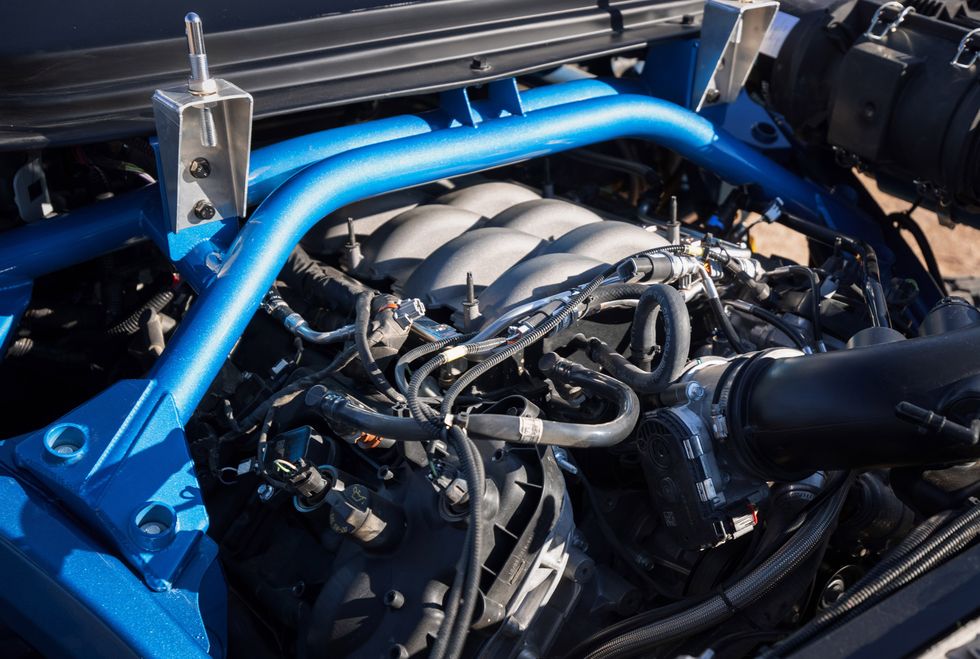A pair of hands plugs my helmet into a filtered air feed, another clips the window net in place. In the seat next to me, Curt LeDuc, Off-Road Motorsports Hall of Famer, keys the intercom. “We’re going to take it easy till the shock oil has warmed up.” Oh, God. I peer past the reassuring lattice crash structure, into the interminable lunar topography of the Southern California desert outside, and ponder at which point my spinal cord will exit through the top of my skull.
Starting at $295,000, the new ultra-hardcore DR— for Desert Racer—is Ford’s ultimate off-road mission statement in its Bronco lineup. The DR channels a decades-long legacy of desert racing that began with a stock first-gen Bronco’s class win of the legendary 1967 Baja 1000, an outright race win in 1969, further class wins in 1971 and 1972, and 15 Baja 1000 Class 3 wins for the ’78-to-’95 model between 2002 and 2019.
Eager to retain the DR’s lineage to the dealer-lot-variety Bronco, Ford deliberately eschewed the traditional tubular frame architecture of top-tier off-road racing Trophy Trucks, instead opting to build it from a production Bronco four-door frame with as many stock suspension and drivetrain components as possible. A standard-issue 10R80 automatic transmission delivers power to the independent electronically locking front and rear 4.70:1 differentials via a stock Ford electronic shift-on-the-fly transfer case. The upper front suspension A-arms are production-Bronco, and a forward section of chassis stiffening, cut from the rear rollover frame of the production Bronco, is visible in the front wheel wells. The rear axle is stock F-150, giving the DR a widened track of 73.3 inches, and the brakes are stock Bronco, or in this case, optional Alcon units. The DR’s power is from a largely stock 5.0-liter Coyote V-8 equipped with thunderous exhaust headers that instantly confute any notion of road legality (the DR is not road legal).
As we buck gently across the landscape, concerns of my intervertebral discs being smashed to a frothy pulp are vanquished. The 80-mm remote-reservoir Multimatic spool-valve dampers give the racer over 50 percent more suspension travel than the production Bronco Badlands—15.7 inches at the front and 17.4 inches at the rear—with hydraulic bump stops soaking up the last few inches of travel from the 37-inch BFGoodrich tires. The DR’s structure is immensely stout, and the electric power-assisted steering—completely devoid of kickback—is full of feel, wildly direct, and confidence-inspiring. From the right seat, LeDuc relays 25 years of Dakar and Baja desert-racing wisdom, his casual wit as dry as the deserts of which it was born, and I begin to relax. Aside from being a tool built for a job, the DR, at this speed, is unexpectedly comfortable and enormous fun.
The big spool-valved dampers have obviously warmed up, and LeDuc gestures ahead. “Okay, we can get on it.” By now I have no idea how fast we’re going, and at this rate, I can’t really take my eyes off the trail to check. I listen to the mechanical chaos beneath us and wonder how much the DR can take. “You cannot break it,” LeDuc reassures me. “Just don’t turn during a jump.” (It’s not the truck that he’s worried about.) Faster still, and the approximately 6200-pound DR begins to float atop the terrain like a speedboat on plane. After years of bucking across these same desert trails in my own lowly road-focused garbage, the stress of not even having to consider mechanical failure is a revelation.
We break out onto a wide, smooth dry lakebed. “Full gas, let’s go.” I press the pedal to the floor, and the DR, now pushing out over 400 horsepower, thunders like industrial machinery. With nothing for miles around to provide a visual clue as to our speed, I glance at the center-mounted screen. We’re at 100 mph, but the ride is so utterly liquid and stable that I would happily sit here for hours, in this Zen-like state, being gradually deafened by five liters of screaming V-8 as the desert gently rolls by. What a fantastic place to be.
The press release describes the DR as “a turnkey racing solution for serious off-road competitors,” but I suspect that many of the 50 cars Ford plans to build will end up in the hands of collectors or wealthy off-road enthusiasts who just wanna rip across the desert in the baddest Bronco there is.
We’re back at base now. I’m back on my feet but still floating from the experience. I look over to LeDuc, pleased to see that he’s still smiling.
“You were at about 40 percent of its capability,” he says, grinning. “This thing is serious. With a bigger fuel tank, it’d do Dakar.”
I look for any sign of a wink or a nod, but he’s just too dry to read.

